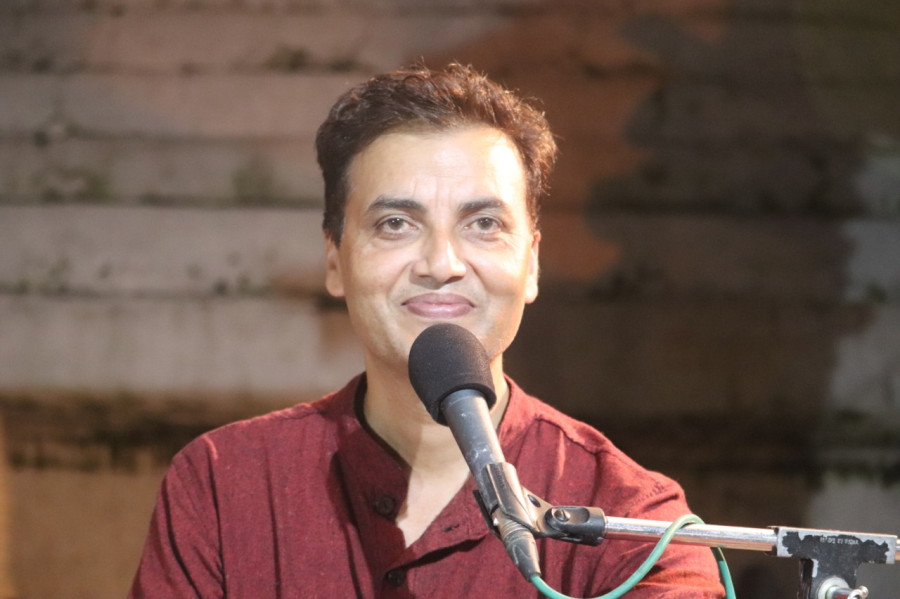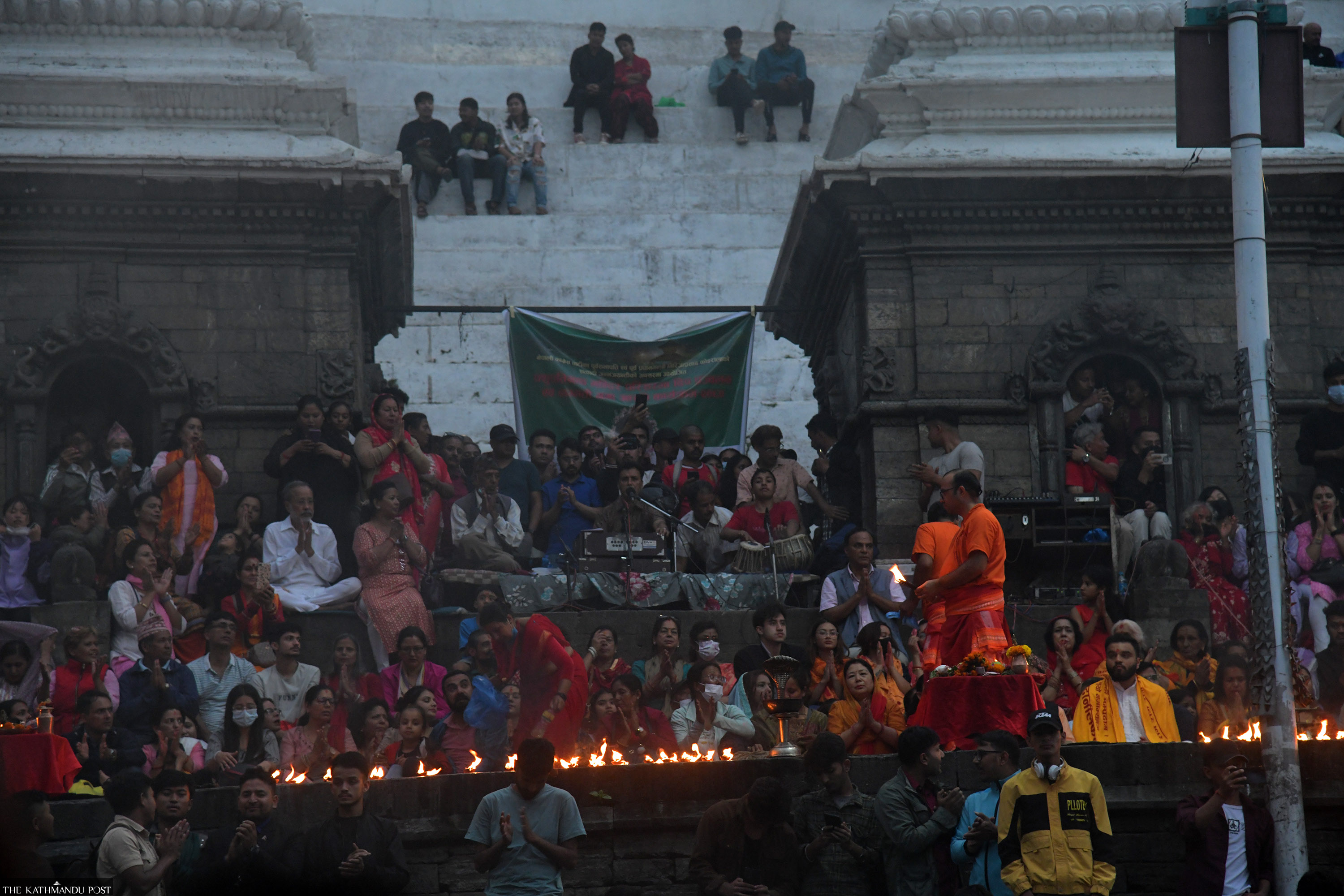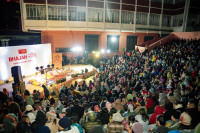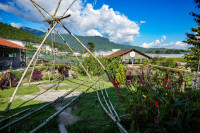Culture & Lifestyle
Melodies of devotion
The current chief of Lalit Kala Campus, Ramesh Pokhrel, played a key role in starting the evening aarati on the bank of Bagmati river at Pashupatinath temple.
Anish Ghimire
Ramesh Pokhrel comes from the serene town of Inaruwa, Sunsari. A maestro of diverse roles—the Campus Chief of Lalit Kala Campus and an accomplished classical musician, his story reads like a melody, harmonising his love for music with his professional journey.
Pokhrel’s musical journey started in the nurturing embrace of his grandparents. Their immersion in spiritual pursuits, particularly their study of the Bhagavad Gita, impacted their dietary habits and instilled discipline in their lives. He said, “My grandmother’s devout worship of Vaishno Devi and her early morning rituals left an indelible mark on me.” Accompanying her to Bhajans as a young boy, he was captivated by the enchanting world of classical music. During these early experiences, he first laid his hands upon a harmonium, igniting a spark that would evolve into a lifelong passion.
Pokhrel’s musical inclinations gained momentum as he actively participated in music competitions during his school years. His thirst for knowledge led him to the bustling city of Kathmandu to study law at Nepal Law Campus. However, his pursuit of legal education did not overshadow his love for music. He diligently sought music teachers who could nurture his talent, leading him to Guru Shamba Dev Sharma. Under Sharma’s tutelage, Pokhrel honed his singing and harmonium playing skills.
During this period of musical exploration, Sharma composed a song titled ‘Kancha Dai Le Goru Nare Hai Bihani Ko Mirmire Gham Mai’, a creation that became a defining moment in Pokhrel’s musical career. The late 90s saw him record this song at Radio Nepal, which resonated with audiences and garnered him widespread acclaim. “The accolades that followed provided a powerful push for me to delve deeper into classical music,” says Pokhrel. Motivated by the recognition, he was propelled to learn and refine his craft, nurturing a strong determination to excel. He recorded another song that received a lot of love from listeners shortly after, titled ‘Hatyo Sara Hilo Mailo’, which is a Dashain track written by famed poet Lekhnath Paudyal.
After completing his bachelor’s, Pokhrel embarked on a journey to Banaras to study classical music more deeply. During his stay in Rishikesh, an incident left an indelible mark on his memory. He recalls, “Along the banks of the Ganga River, my friends and I witnessed a spirited and soul-stirring aarati performance, a spectacle that resonated deeply within us.” The energy and soulfulness of the performance captivated their senses.
Upon his return to Nepal around 2007, a pivotal moment of inspiration led him and his friends to gather at his residence in Gaushala and plan to introduce a similar aarati ceremony at Pashupatinath temple. They acquired permission from the Pashupati Area Development Trust for it quickly enough, although the inception of this endeavour encountered challenges. Economic constraints and various other factors presented hurdles during the early phases. Nevertheless, with unwavering dedication, he and his friend Dharma Das Budhathoki consistently led the aarati performances and embraced the learning process that accompanied the journey.

“The primary motive of our initiative was to transform the Pashupatinath temple into a sanctified haven for Hindu devotees worldwide, radiating the essence of pure Hindu religious practices,” explains Pokhrel. As time unfolded, many devotees united with their cause, fostering a profoundly enchanting atmosphere during the aarati ceremonies. Over time, the Pashupatinath aarati has taken on a serene and spiritually uplifting vibe that encapsulates the spirit of devotion and worship. One can see some attendees swaying about in dance, praying along—harmonising with the bhajans, while others are overcome with emotion, their tears reflecting their soulful spirituality.
Numerous devotees also approach Pokhrel and Budhathoki, offering heartfelt blessings that come from the depths of their souls. “This profound affection directed towards our efforts is what we cherish the most,” says Pokhrel.
About the current musical landscape in Nepal, Pokhrel says, “The current and forthcoming landscape appears promising as classical music gains traction among the youth, enjoying increased interest and accessibility.” Unlike earlier times when access to classical music and instruments was largely limited to those with privilege, music enthusiasts can easily access classical music education now.
Pokhrel states that the influence of classical music gurus from India, who have journeyed to Kathmandu to share this art form, has been instrumental in this transformation. Recognising classical music as the foundational grammar of the broader musical realm, music enthusiasts have come to understand its vital role in musical education. This, the musician believes, understanding has translated into a surge of stage performances dedicated to classical music, fostering a space for its appreciation and celebration.
Yet, amidst the optimism, there exist certain challenges that warrant consideration. A prevailing notion among some parents is to perceive music as a mere hobby rather than a viable career path for their children. Consequently, nurturing the pursuit of music as a profession remains a challenging task. As the music landscape progresses, there is a growing concern to address how musicians can sustain their livelihoods through their craft. “While efforts have been taken in this direction, there remains significant work to be done to ensure the vitality of this artistic realm,” he expresses.
In a reflective moment, Pokhrel’s voice resonates with memories of his father’s aspirations. “My father wanted to see me become a lawyer,” says Pokhrel. So, when Pokhrel journeyed to Banaras, his father grew concerned, fearing his son had become a rebel and run off with a harmonium. “He thought I had become a hermit,” recalls Pokhrel. As he matured, conversations bridged the gap, and his chosen path earned paternal approval. Today, as the Campus Chief of Lalit Kala Campus, he orchestrates responsibilities colossal in nature. Amidst all that, he rejoices in the routine of teaching, singing, and yoga—occasionally lending his voice to the aarati ceremony, which is now handled by his colleagues.
Despite all the work he has done, Pokhrel doesn’t seek the spotlight. “The pursuit of fame drains authenticity,” he says, adding, for him, life’s splendour lies in its simplicity and the peace it offers.




 15.12°C Kathmandu
15.12°C Kathmandu















